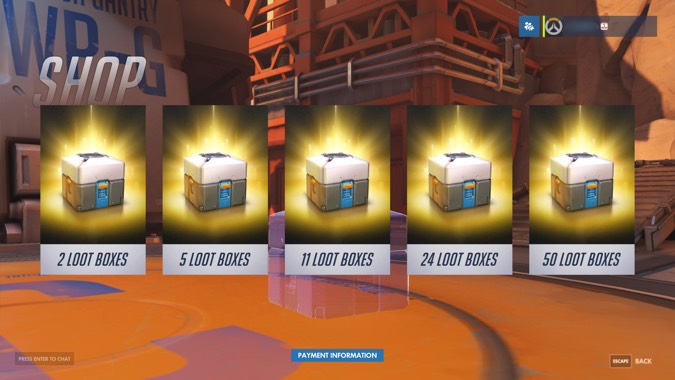Loot boxes: a dangerous loop
Should loot boxes in video games be considered a method of gambling? For some gamers, the answer might seem obvious, but it might be a bit more complicated than one would think. Before any verdict can be made about this however, it is important to understand what a “loot box” is: it is a box found in video games that allows the player to acquire in-game items such as skins (a costume change) for characters or weapons. The catch is that when one gets said loot box, whatever is inside of the box is not guaranteed. This means that it is entirely random what the player will receive. This practice is commonly found in Free-to-Play and mobile games such as Clash Royale and Team Fortress 2 as a way to make a profit. It is not unlike a mystery pack of baseball or Pokemon cards.
Though this might sound like a harmless practice — as the loot box items found in most games do not affect gameplay and can be purely cosmetic — it really isn’t. Take Counter Strike: Global Offensive (2012) (a.k.a. CS:GO) for example. In this game, you can acquire skins for weapons either via loot box or by trading skins with another player. This quickly became a problem after third-party websites started making gambling website spinoffs where people would gamble with skins using casino-style chance games. This practice has been labeled as one of the largest scandals in gaming history by Dot Esports, and is only one example of loot boxes being a problem.
Another game using the loot box system is Overwatch. Overwatch is a team-based shooter that uses loot boxes to get skins for characters. These loot boxes can be earned every time you level up (which proceedingly gets more difficult) or by purchasing them via an in-game store. My personal experience with this is rather unfortunate; while playing the game, I spent hours trying to level up to get loot boxes in hopes that I would receive a skin that I wanted, but of course after 40 hours of gameplay and nothing to show for it, I caved and purchased a pack of 50 loot boxes that cost me $39.99, the cost of the game itself. Thinking that would be enough, I opened all of them, and to my disappointment I did not receive the skin I was looking for. What this shows is that given enough time and hype, anyone would be willing to spend money just for the chance to get what they want. I know I’m not the only one this has happened to, as many people online have complained about the very same thing as seen on Blizzard’s Overwatch forums. The difference between Overwatch and CS:GO is that in Overwatch, you cannot buy or sell skins directly, you have to buy or earn loot boxes, or you can also earn in-game currency to purchase skins. However, the only way to “earn” the in-game currency is by receiving them in loot boxes. The only way you can get what you want is by chance, which forces people to spend more money. It’s a dangerous loop.
While Overwatch and CS:GO are offenders of this scheme, they don’t begin to compare to the scale of Electronic Arts (EA) offenses in their latest game, Battlefront II. EA is the second-largest gaming company in the Americas and Europe with nearly $5 billion revenue in 2017. They have taken what Overwatch and CS:GO are doing, which has drastically affected gameplay by giving an unfair skill advantage over other players, not simply a better looking outfit or a cooler-looking gun. This has sparked a massive outrage toward EA and loot boxes in general.
What can we do to help stop this rise of the loot boxes? The first thing that you can do is to stop buying loot boxes all together, these developers should not get rewarded for implementing what is essentially a gambling system. Another thing that you could do is contact the development team and provide constructive criticism; you can contact development teams in many different ways, for instance: their Twitter page, subreddits, Facebook pages, or by simply going to the developer’s website. It is important to fight back against this poor business practice so that gamers can play games without being forced to gamble.












